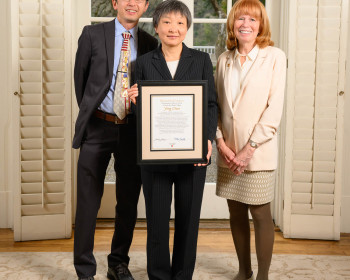Law professor blogs about environmental issues while teaching in Spain and Italy
Open gallery

Melissa Powers, an associate professor of law, has launched a blog called “Enumerated Powers” to share her observations about environmental issues in Spain and Italy, where she will be teaching climate change law this spring.
Among her first blog entries, Powers muses over the vast differences between Bilbao, Spain’s mass transit system and those common in the United States.
“Bilbao was a heavily industrialized city for many, many years that fell on hard times when steel production slowed down in Western Europe,” Powers writes. “After a long period of depression, Bilbao decided to invest in the arts and culture as a way to revive its economy. It welcomed the amazing Guggenheim Museum (more on that later), and invested in infrastructure improvements, like a subway and pedestrian bridges and light rail, all designed to make the city more livable and welcome to tourism. From my perspective, these efforts have paid off.”
Powers will be teaching as a visiting professor in Pamplona, Spain at the University of Navarra and then in Trento, Italy, at the University of Trento. This is her second time teaching at the University of Trento, thanks to the law school’s participation in the International Union for Conservation of Nature Academy of Environmental Law, an academic organization focused on increasing capacity of and collaboration between environmental law scholars.
Powers teaches courses in energy law, climate change law, ocean and coastal law, among other topics. Her research interests include statutory interpretation and domestic policies aimed at mitigating climate change. She and fellow law professor Chris Wold co-authored the first legal textbook on climate change in the world.
From 2003-2008, Powers was a clinical professor at the Pacific Environmental Advocacy Center, the environmental law clinic at Lewis & Clark. Her clinical work focused primarily on pollution-control litigation, with a particular emphasis on the Clean Water Act. During her tenure there, Powers successfully litigated several cases in federal and state courts.
Law Communications is located in room 304 of Legal Research Center (LRC) on the law Campus.
MSC: 51
email jasbury@lclark.edu
voice 503-768-6605
Cell: 626-676-7923
Assistant Dean,
Communications and External Relations, Law School
Judy Asbury
Law Communications
Lewis & Clark Law School
10101 S. Terwilliger Boulevard MSC 51
Portland OR 97219

